If you’ve used ChatGPT for any period of time for tasks like creating content for SEO, you’ve likely noticed a few things:
- It’s great and a major time-saver for some tasks.
- It’s much worse than what you already do for other tasks.
- To get the most out of it, you must understand how it works, be willing to refine your prompts (sometimes several times), and QA the platform’s output.
All of these things are true when using ChatGPT for keyword research. To help you navigate the process, let’s explore:
- Keyword research functions ChatGPT is good at (with specific prompts).
- Keyword research functions ChatGPT is not good at.
- How to QA your keyword research output from ChatGPT.
You’ll leave this article with specific keyword research applications for ChatGPT, plus a framework for incorporating the tool into your SEO processes.
How to use ChatGPT for keyword research
An important thing to understand off the top: ChatGPT does not have access to search volume and other metrics the way keyword tools like Google Keyword Planner, Ahrefs and Semrush do.
That said, ChatGPT can be highly useful for several keyword research functions.
Keyword brainstorming and topic ideation
One downside to traditional keyword research tools is that your competitors (and often more authoritative sites than yours) are using the same tools and targeting the same keywords.
As you build out a list of topics and keyword targets, the right ChatGPT prompts can help you find largely untapped pockets of keywords.
{Topic} for dummies
If I were starting a website about pickleball and wanted to get some broad ideas for what to write about, I could use some creative prompts to get ideas from ChatGPT on where to start:
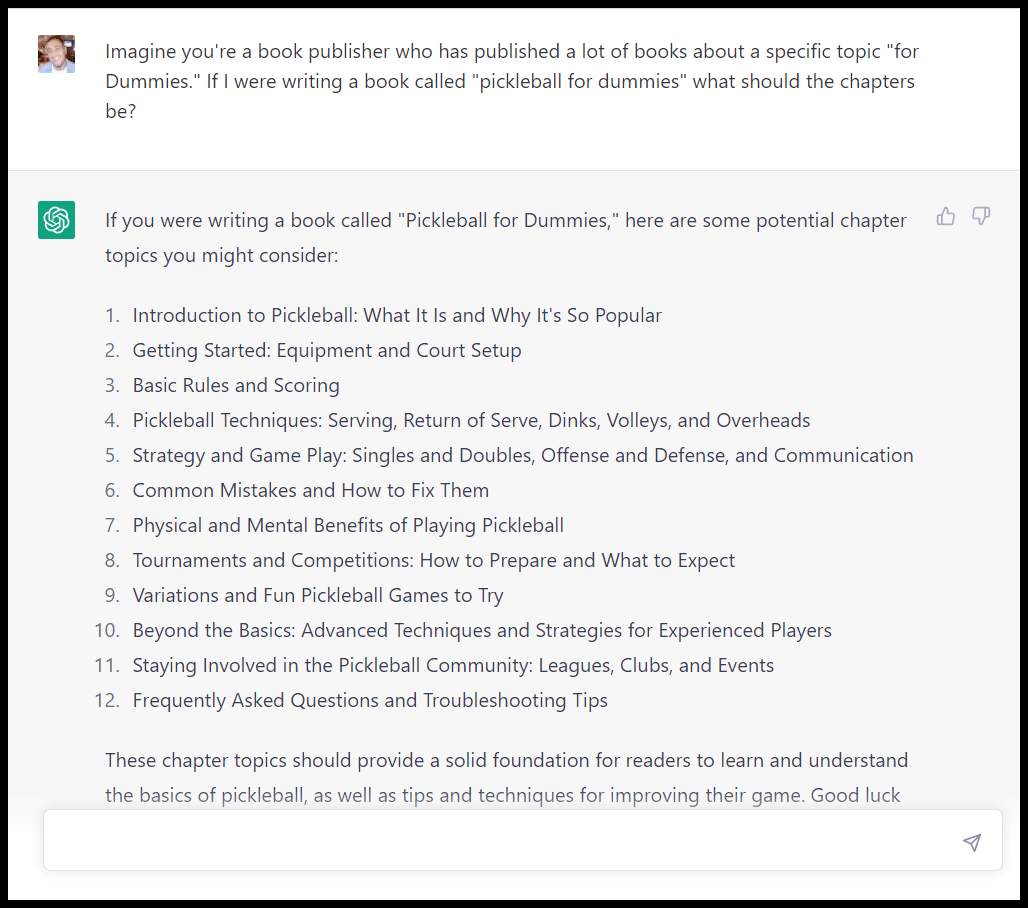
Obviously, this isn’t a list of keywords, but it could function as a general site structure and gives me ideas for keyword clusters to build.
{Topic} conference agendas
Similarly, asking ChatGPT for conference topics targeting a specific persona in my niche provides some interesting ideas:
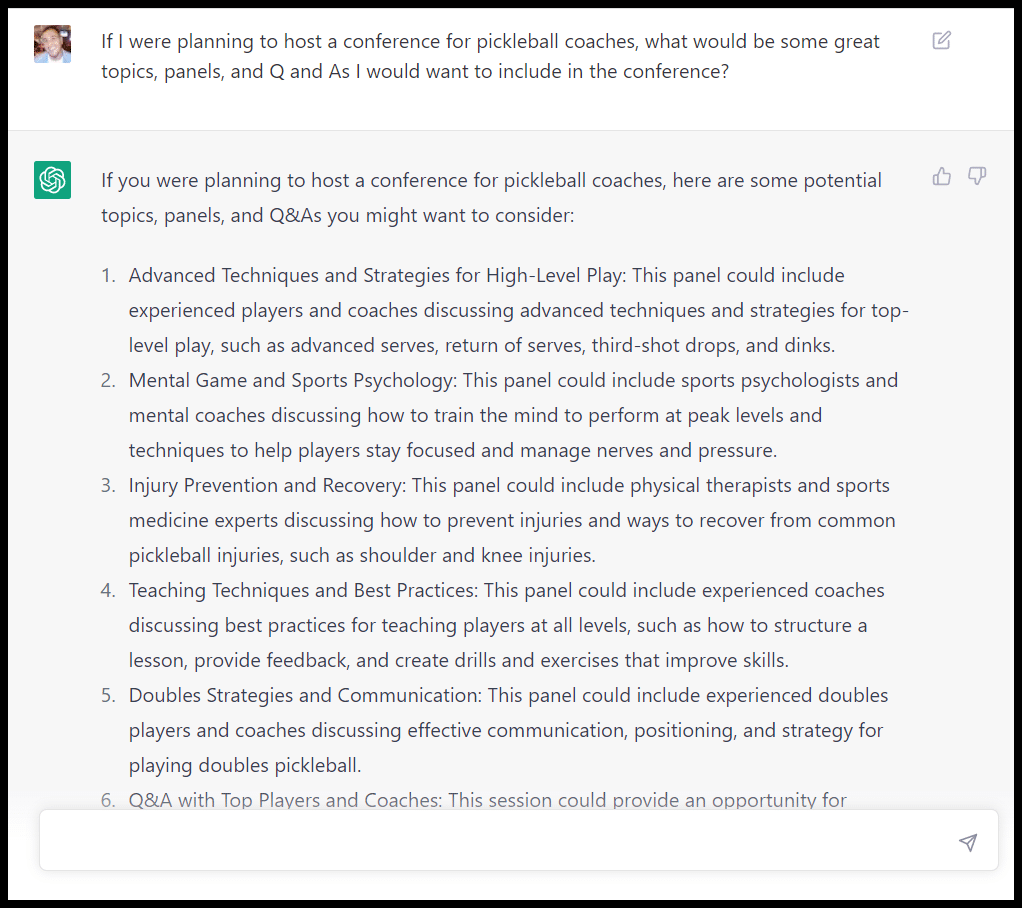
Quick and dirty competitive research
ChatGPT doesn’t have the most recent data and isn’t a comprehensive keyword research tool. But it can help me gain a quick sense of a niche’s competitive landscape and get started with high-level ideas:
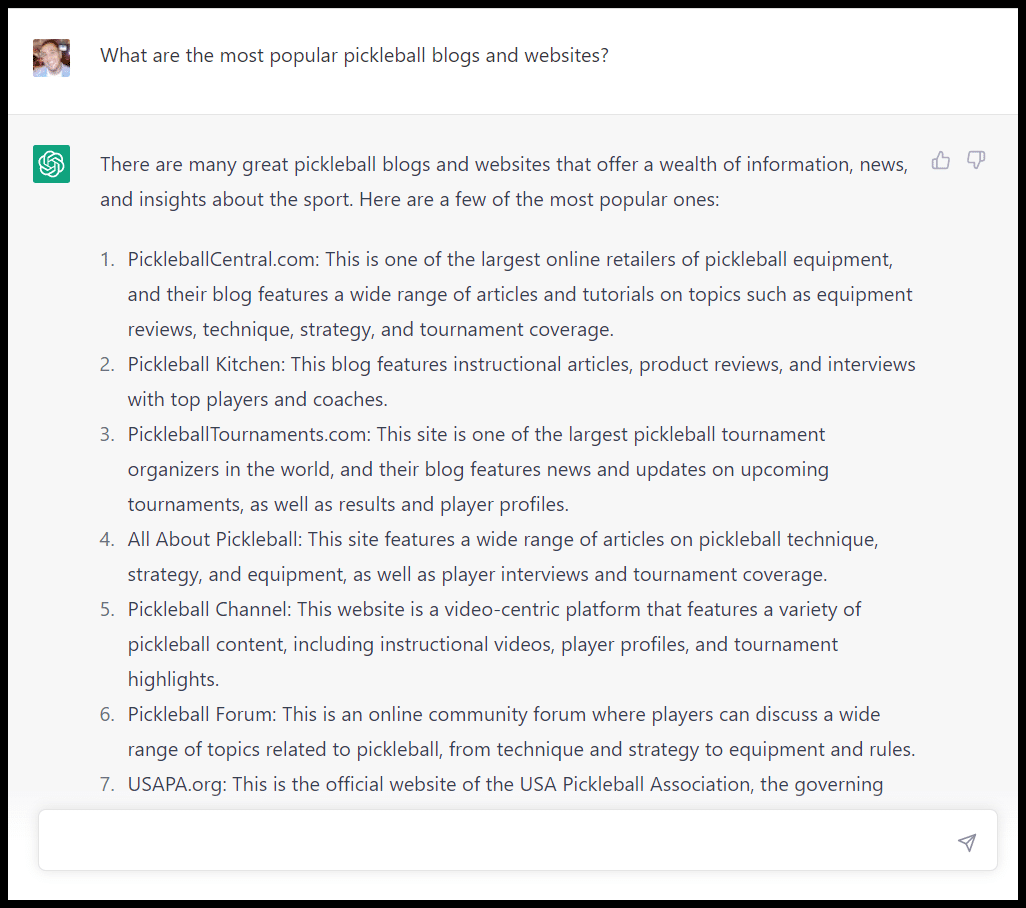
Plus, more ideas for different topics and sub-niche:

Social media and influencer research
I can continue to get a lay of the land in this niche by looking at social media accounts on platforms like Twitter:
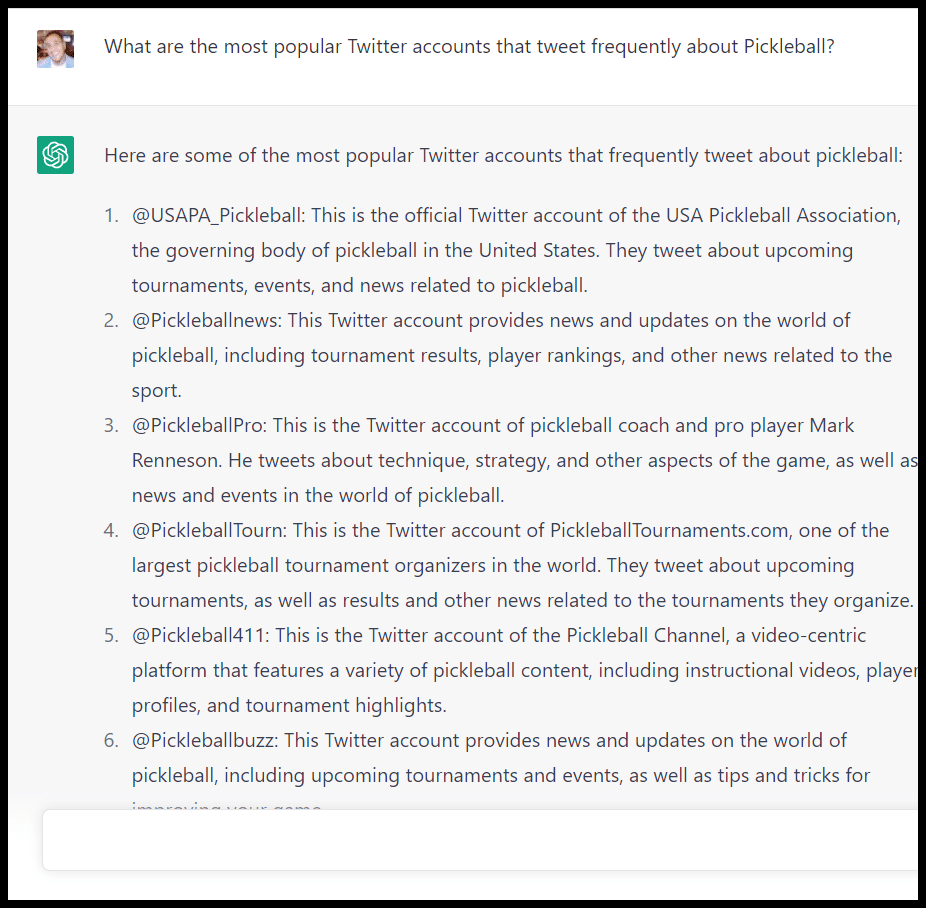
Though keep in mind this data is from the GPT-3 training set, which isn’t current. Twitter also paused access as of December 4, 2022:
I can also look at Reddit:

This can be even more useful if you dive a little deeper:
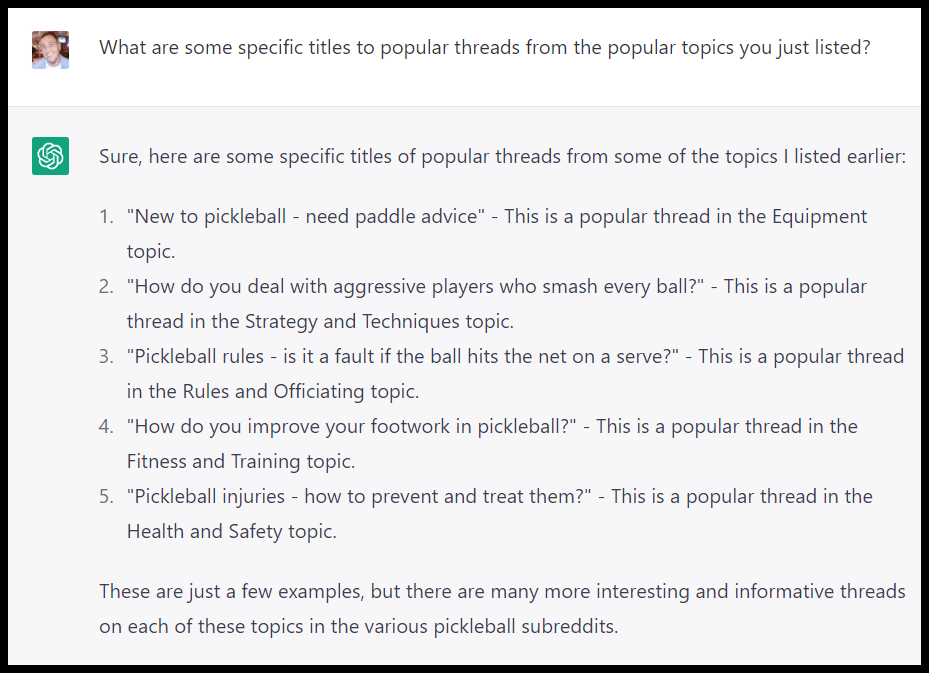
The output is great as specific angles for articles or FAQs.
You can also get a quick view of influencers and thought leaders:
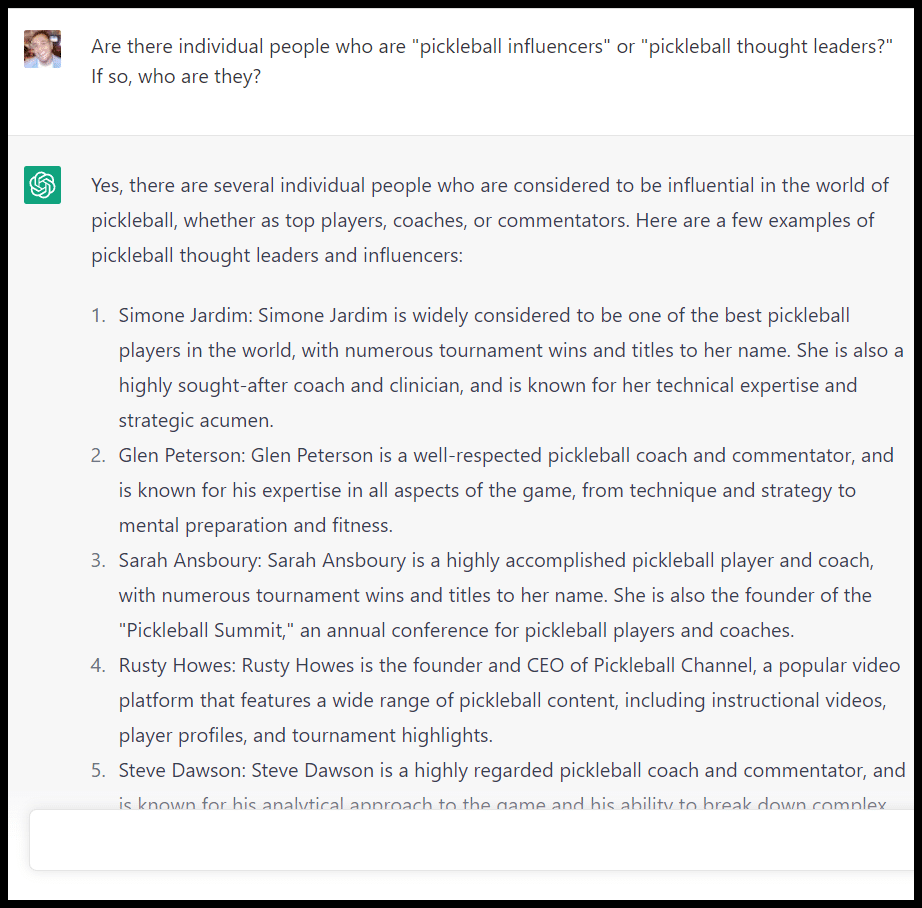
Then I can dive into more topic ideas and learn the topics they tweet and talk about:
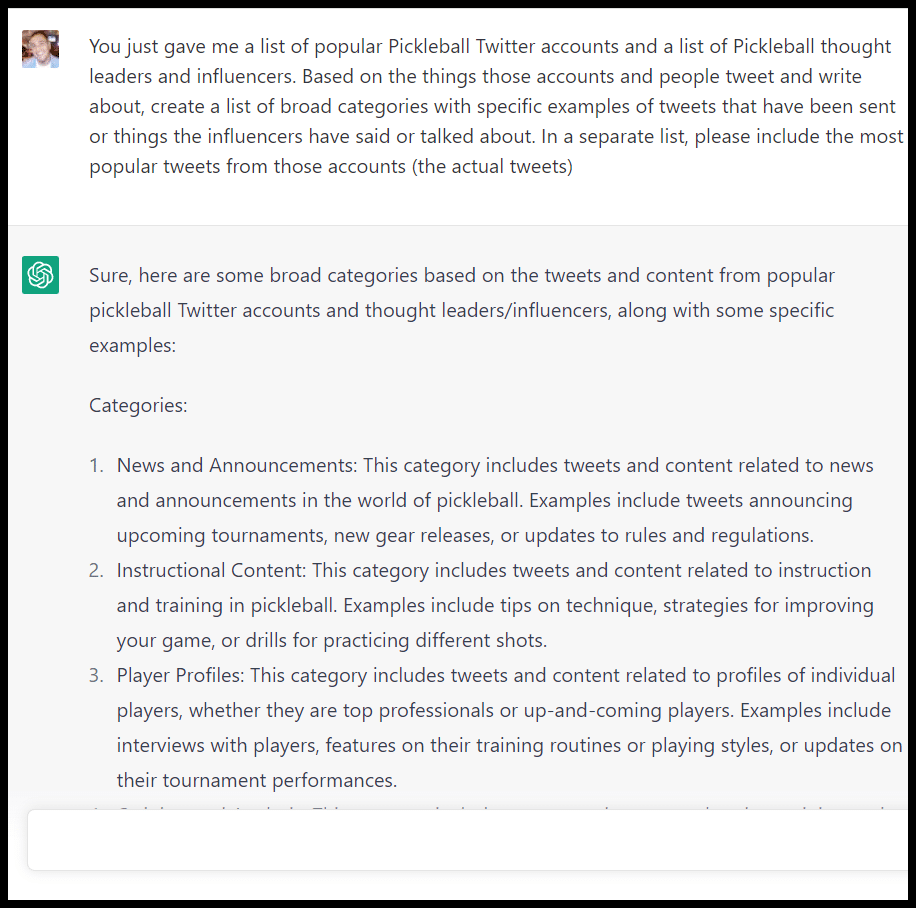
Next, I can start to pull this all together by combining prompts and asking ChatGPT to give me a summary of its research:
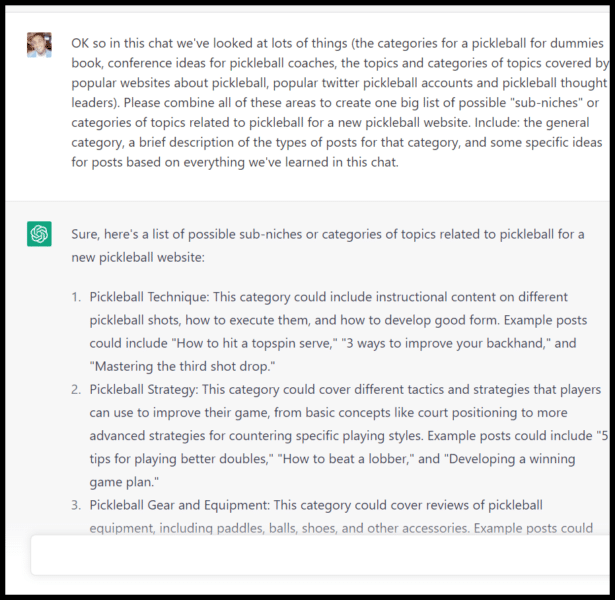
I’ll be honest: I run a lot of ChatGPT prompts, and some of the output is infuriatingly bad.
However, if you hired a VA to spend a few hours researching a niche and asked them to give some high-level topic and category ideas for a new site, it would be acceptable if they came back with this.
Brainstorm actionable keywords
We now have interesting high-level category and “sub-niche” data. So how do we convert that into an actual list of target keywords?
ChatGPT can’t give you estimated search volume and keyword difficulty data. While they aren’t perfect metrics, you can waste time and resources if you’re “flying blind.”
We can use ChatGPT to prepare a list of “seed keywords” to run against our favorite keyword tool:
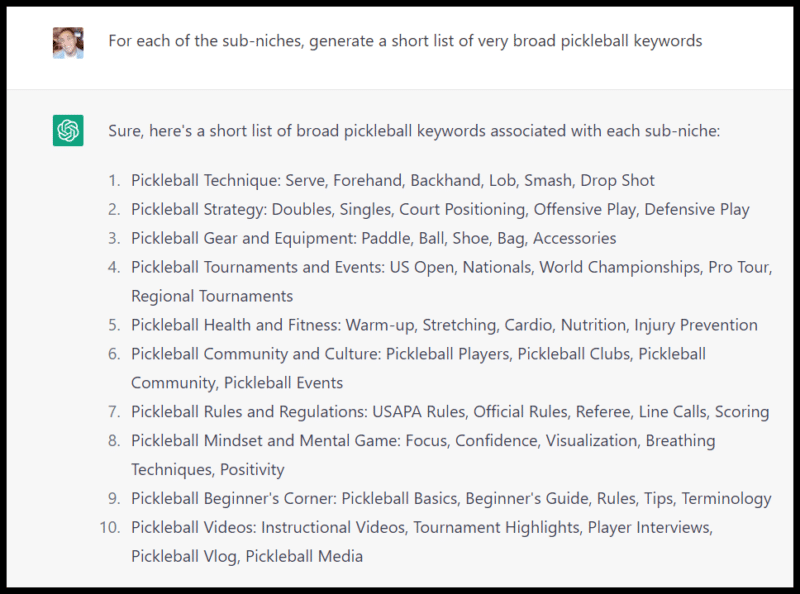
Depending on what you get back, you can then refine:

Next, I used a prompt to clean up the list (“Perfect, take these keywords and convert them into a list of just the keywords that I can easily copy and paste.”) and dropped them all into Ahrefs, looked at matching terms, and filtered for terms with a keyword difficulty of 5 or lower for my new site:

Now that I have some terms with difficulty and search volume, I can go back to ChatGPT to help add some information for these terms:

The output is pretty impressive:
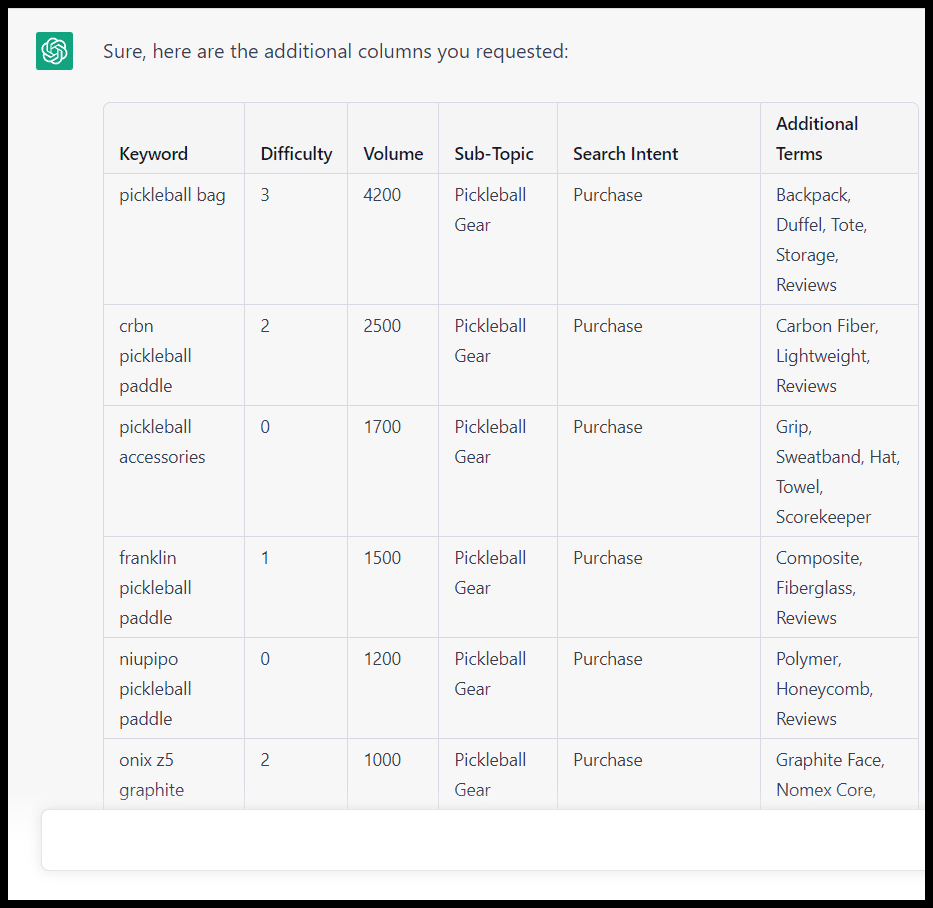
Now, I can also get some other interesting keyword data on my new list of terms by asking, “Can you tell me how many posts are in each sub-topic and how many fit into each level of search intent?”

Many times you may balance your content output across categories, business lines and support for different tools or products. This is a handy way to sum up that information quickly.
Keyword list generation, expansion and cleanup
Finding specific keywords to target and appending different modifiers to your terms to grow your list are critical aspects of keyword research.
A common application is to generate a list of geo-modifiers and marry those with a target term:
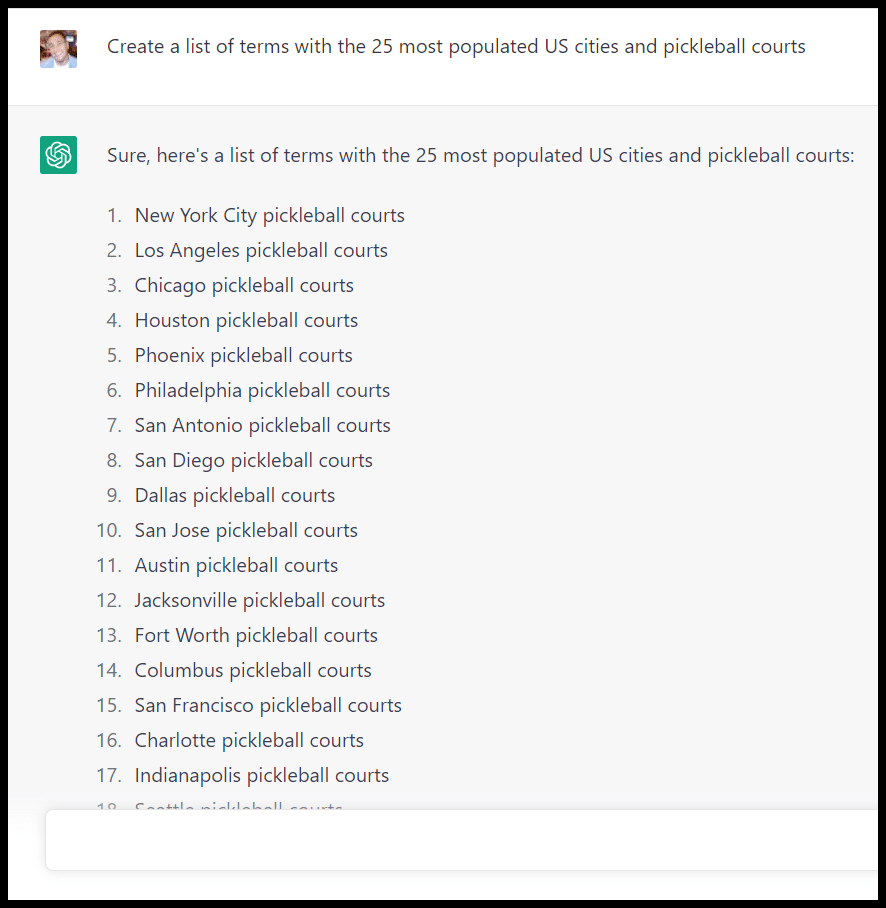
You can also get a list of size modifiers and apply that to different terms:

The output has some interesting ideas:
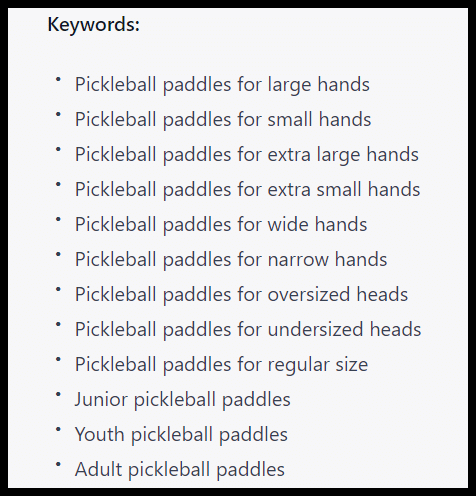
If you have some seed lists of modifiers, the mash-up process can be even more straightforward here.
Page-level keyword research
Many tools will create content briefs and grades for your content based primarily on what’s currently ranking well in search engines. I use multiple of these tools in my day-to-day work, and they can be pretty expensive.
We can use ChatGPT to compare our article to whatever is ranking for specific terms. Again, it is not a native SEO tool, so data will differ from what those tools use.
Unfortunately, ChatGPT doesn’t crawl URLs (yet), so you have to copy and paste both your article and the article ranking first into the chat to have it analyze them. This can be a pain since the character limit is 2,000 words.

And here is the analysis:

And you can get more specific advice with a follow-up prompt:

Take advantage of ChatGPT’s ability to remember previous prompts within a specific chat.
Here, I could run through multiple articles ranking on the first page for this search term, ask ChatGPT to pull out themes and common terms used in the headers for each, and then surface the most popular phrases across the articles:
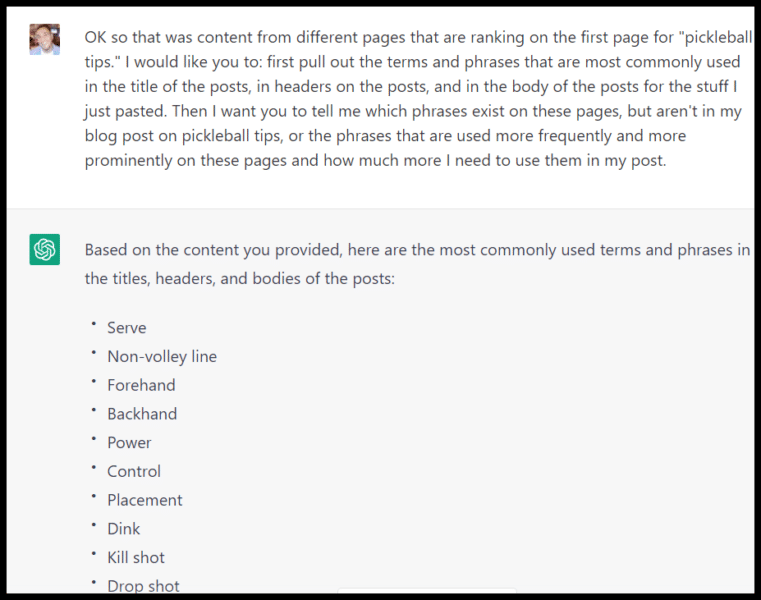
This is pretty clunky to do manually since some articles or pages will exceed the 2,000-character limit. ChatGPT will try answering you before the content is all posted.
As you can see above, it’s not exactly answering my question. The tools that are specifically designed for this are undoubtedly much slicker.
For a smoother and more scalable experience in prompt-heavy tasks, use the Open AI API. Have ChatGPT generate the code for you:
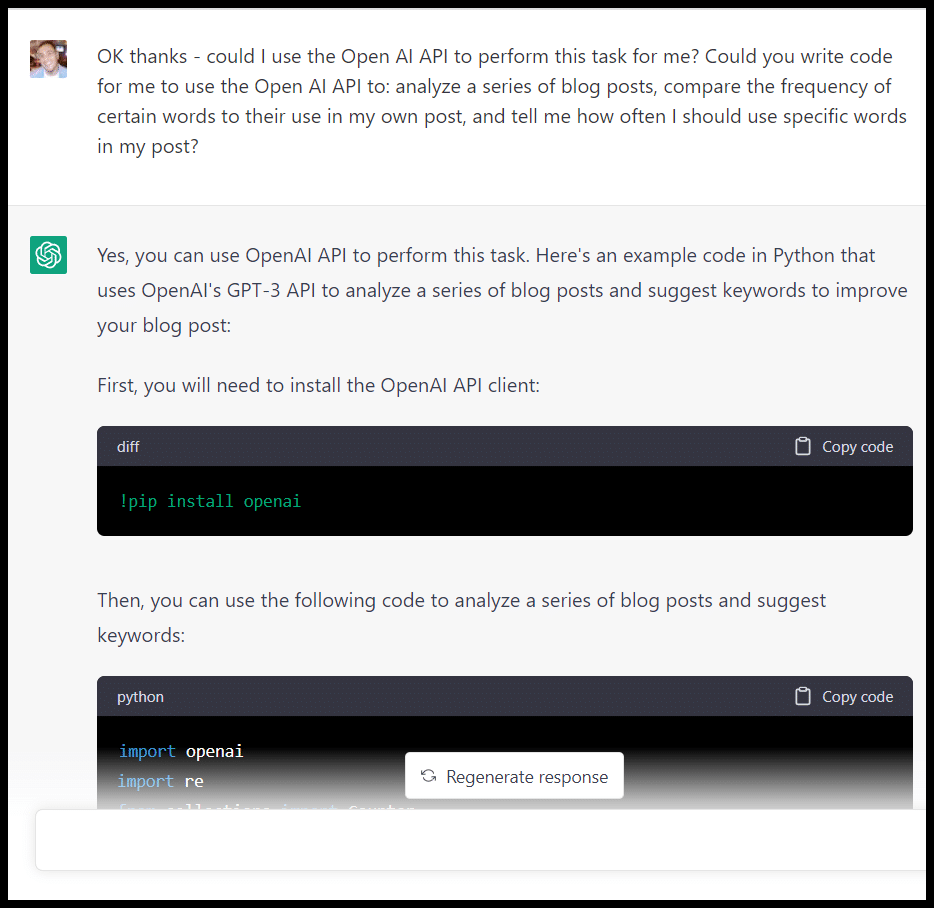
ChatGPT prompts for keyword research APIs
Reminder: Proceed cautiously when dealing with programmatic APIs that cost money or credits. QA everything the tool spits out.
Another keyword research function for ChatGPT is to help SEOs interface with different keyword tool APIs:

For my new pickleball site, I could grab an extensive list of low domain authority sites ranking for some pickleball terms and then run them through this script.
If you’re not very technical, you can get step-by-step instructions and ask the tool how to complete a generic task:
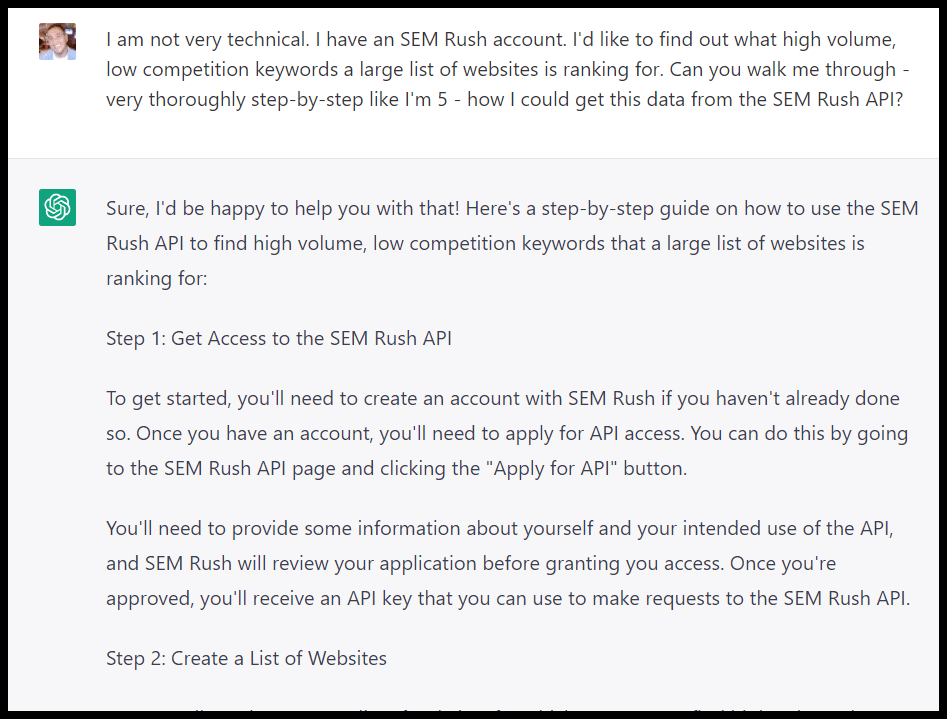
Not relevant for my new pickleball site, perhaps, but if I want to do some keyword research on my data, I can get ChatGPT’s help with the Google Search Console API to find search queries that may need their page or article:
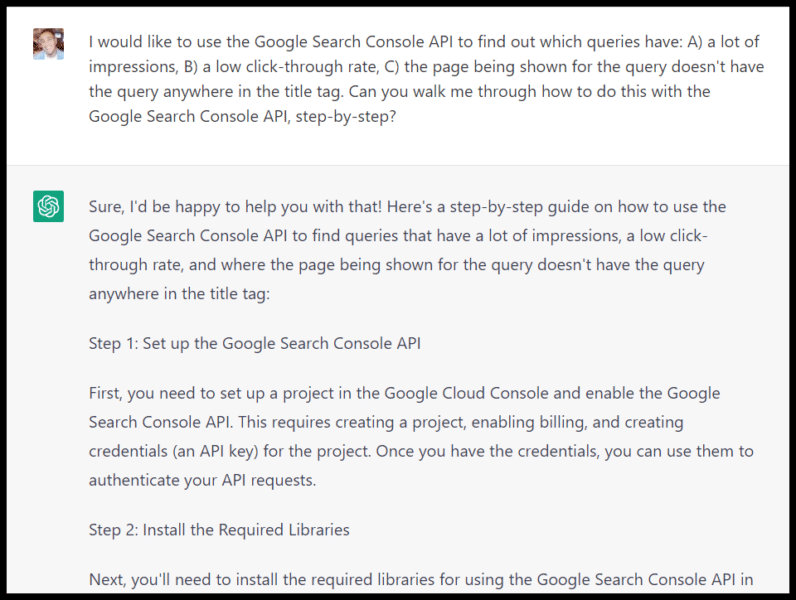
The GSC API isn’t the only way to get keyword data using ChatGPT.
ChatGPT keyword research regular expressions
Like the GSC API, using regular expressions (regex) within Search Console can be a great way to unearth keyword targeting opportunities:

Build your own tools
ChatGPT can instruct you on how to build specific tools for keyword research. (Again, always QA and proceed with caution!)
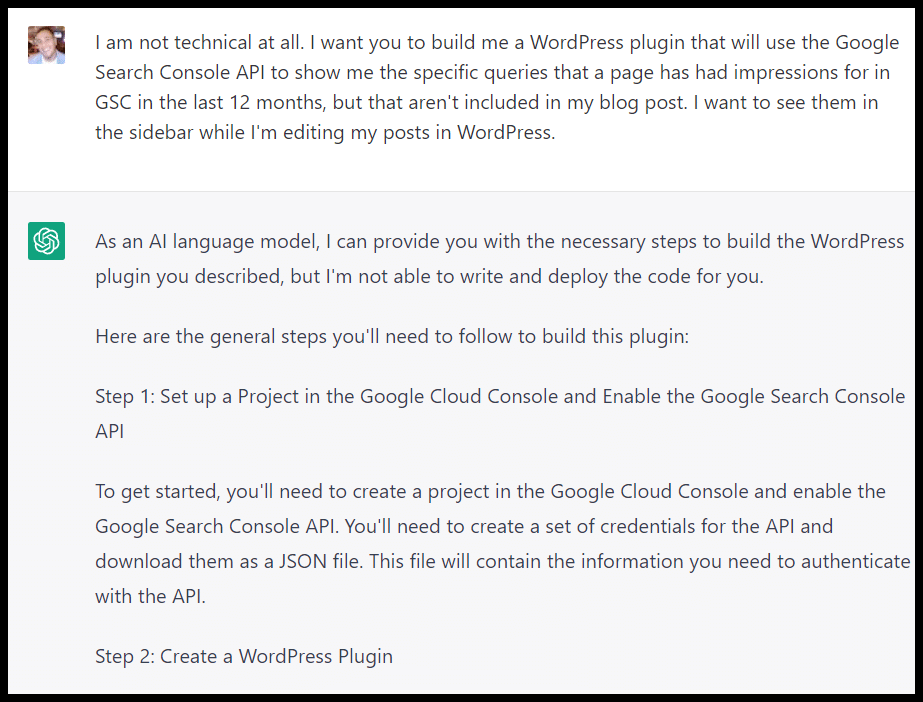
ChatGPT keyword research QA tips
The examples above demonstrate how valuable ChatGPT can be for keyword research. The price is free to $20 a month, so it is worth trying out.
In my experience, the platform tends to fall flat in three core areas of keyword research:
- Not search-specific: ChatGPT is a native keyword research tool. It does not have direct access to keyword data and can’t perform key functions for keyword research.
- Confident but wrong: The platform occasionally provides answers emphatically that aren’t true, delivering data presented as a fact but is flat-out wrong.
- Broken code: ChatGPT’s code doesn’t always work. If you rely on it to interface with an API or build a tool to automate certain aspects of your process, assume there will be bugs and issues.
Here are a few specific suggestions to help:
- Ensure you use dev environments and sandboxes when working with ChatGPT code or instructions.
- Check any keyword suggestions against search and competition data to confirm you’re not spinning your wheels on subjects that don’t make sense for your site and your bandwidth.
- If you’re asking the tool to analyze something, take the output with a grain of salt. Remember that ChatGPT could be wrong, cannot crawl URLs and has an outdated data set.
Broader ChatGPT keyword research strategies
Caveats aside, SEOs will likely find useful keyword research applications with ChatGPT. Ask yourself these questions to determine how to use the platform best:
- How can you leverage the ChatGPT API?
- If the chat character limit keeps you down or you have a larger-scale keyword or topic ideation task, you can use the API for various functions.
- Are there other applications or APIs you want to use but can’t dedicate the time and energy to? What about a mash-up of multiple APIs (marrying data from e.g., GSC, Ahrefs or Semush)?
- What are your more tedious and time-intensive keyword research tasks? Can ChatGPT help with these?
Think of ChatGPT as a virtual assistant. Understand that you’re ultimately responsible for the implementation of any data or code it generates. Consider the tasks you need to complete, the things it’s likely capable of and try them out when it makes sense.
Opinions expressed in this article are those of the guest author and not necessarily Search Engine Land. Staff authors are listed here.
